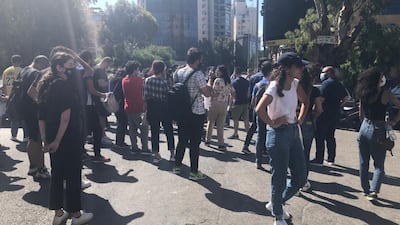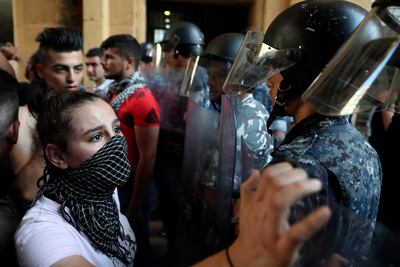Lebanon’s military interrogated a prominent student activist on Monday after he took part in a university protest, a move rights defenders say is a worrying attempt to stifle dissent.
Karim Safieddine, a student leader from the Mada Network, a political youth group that has gained momentum in the aftermath of the October protests, said he was summoned by military police for allegedly throwing rocks at security forces during a protest against tuition fee hikes at the American University of Beirut last December.
He denies allegations of violence and said on Twitter that he “did not touch one stone”.
"This is an attempt to intimidate us," Mr Safieddine told The National after his interrogation.
“Authorities are sending us a political message because our student grassroots movement is becoming more widespread.”
Activists and human rights defenders said Mr Safieddine’s interrogation was part of a wider clampdown on individuals who were active in the mass anti-government protest movement of late 2019.
An army representative declined to comment on the issue.
More than a million Lebanese took to the streets in October 2019 to demand the downfall of the ruling elite, widely accused of corruption and fomenting one of the worst financial crises in the country’s history.
Inspired by this movement, the protests at AUB drew students from all sects, a rarity in a country where people’s politics fall along sectarian lines. They also inspired other universities to mobilise.
About 50 supporters of Mr Safieddine gathered outside the military police station where he was interrogated.
They held banners that read “state oppression does not scare us, the student movement lives on” and chanted “the military is stifling protesters”.
Protester Farah El Baba, 25, said Mr Safieddine’s interrogation was meant to dissuade other young people from speaking out and mobilising.
“They picked one of the most vocal activists in order to scare others,” she said.
The Mada Network has helped students across Lebanese campuses create independent, mostly secular clubs in the past year and mobilise against Lebanon’s ruling elite.
Jad El Hani, 21, an activist at AUB, said the security forces have been calling student leaders to inquire about their activities since the December protests.
“The establishment considers us to be a threat to them and they are targeting our members and our co-ordinators one by one,” he said. “With parliamentary elections coming in a year, they are sending us a clear message.”
Human rights organisations have decried crackdowns on activists since the onset of the October 2019 protests.
Aya Majzoub, a Lebanon researcher at Human Rights Watch, said security forces are using interrogations as a tool to harass and intimidate protesters.
"Authorities are cracking down on people who are prominent in the October protests," Ms Majzoub told The National.
“That makes people think twice before participating in protests. It’s a form of intimidation. It’s definitely a trend we are very worried about.”

Military courts in Lebanon can interrogate and try civilians, a practice that has often been criticised by rights groups.
In February, 35 protesters including two children were charged by a military tribunal with offences including terrorism after they took part in demonstrations against deteriorating living conditions.
“No civilians should be under the jurisdiction of the military courts,” Ms Majzoub said.



